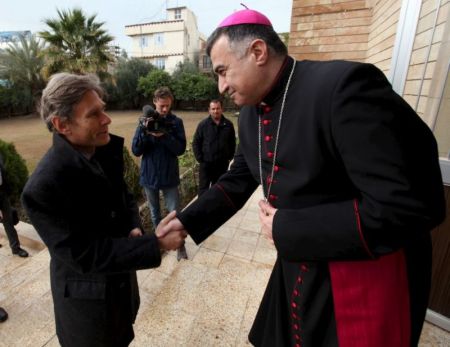Archbishop tells G20 event Christianity 'on the very edge of extinction' in Iraq

Speaking at a G20 event centered on religion's role in helping solve global problems, an Iraqi archbishop warns that Christianity in his country is "on the very edge of extinction."
The Most Rev. Bashar Warda, the Chaldean Catholic Archbishop of Erbil, spoke last week at the G20 Religion Forum in Bali, Indonesia, an event attended by more than 300 religious leaders from across the globe.
He gave a speech titled "The Future of Religious Pluralism: A Warning from Iraq," a copy of which was emailed to The Christian Post.
During his remarks, the archbishop stressed that "sectarian violence" is a significant problem in Iraq. This country suffered the rise of an Islamic State stronghold during the last decade in which thousands of Iraqi religious minorities were killed, enslaved or forced to flee their homelands.
Warda stated, "without an end to this sectarian violence, there is no future for religious pluralism in Iraq, or anywhere else in the Mideast for that matter."
"The brutal logic of this is that there does eventually reach an end point where there are no minorities left to kill, and no minorities left to persecute," said Warda.
"Such is the bleak future of religious pluralism in Iraq today. As I share with you this experience, I pray that you will find in our story a clear warning to you all."
Warda noted that after around 1,900 years of existing in the region, "we Christians of Iraq now find ourselves on the very edge of extinction."
"Our Christian ancestors shared with Muslim Arabs a deep tradition of thought and philosophy and engaged with them in dialogue respectfully since the eighth century A.D. The Arabic Golden Age, historian Philip Jenkins has noted, was built on Chaldean and Syriac scholarship," he continued.
"Now we face the end in Iraq, the same end faced by the Iraqi Jews before us, and the same end now being faced by the Yazidis, with whom we have suffered so much pain, alongside us."
There is "a fundamental crisis of violence within Islam" that "can no longer be ignored," Warda said, adding that it "continues to affect the entire Middle East, Africa, Asia and beyond."
"And if this crisis is not acknowledged, addressed, and fixed, then there can be no future for Christians or any other form of religious pluralism in the Middle East," the archbishop said.
"Indeed, there is little reason to see a future for anyone in the Middle East, including within the Islamic world itself, other than in the context of continued violence, revenge, and hatred."
Warda acknowledged that "we Christians have too often embraced the most radical and violent interpretations of our faith," looking at the Second Vatican Council's official recognition of religious freedom in 1962 as a critical turning point.
"This is where we Iraqi Christians are today: not forgetting, but still forgiving. Can our Muslim brothers and sisters follow us in this, or will their own story of violence continue, destroying themselves eventually?" he asked.
"Fundamentally, this change in direction can only come about as the conscious work of the Islamic world itself."
Open Doors USA, a watchdog group that monitors persecution in over 60 countries, ranks Iraq as the 14th worst country in the world when it comes to Christian persecution.
Although Christians in Iraq once numbered around 1.5 million, that number has fallen to below 200,000 today as the Christian population has deteriorated since the United States military intervention began in 2003.
Although the Islamic State's stronghold in Nineveh Plains was eradicated in 2017, the country remains plagued by conflicts that "gravely affect the country's minority Christian population," according to Open Doors.
"In June 2020, Christian villages were bombed in Turkey's largest operation in the area since 2015, forcing many Christians to flee," an Open Doors factsheet reads. "In May 2021, Christian villages were evacuated following Turkish bombing in the region. Christians were not protected by the local government."
Additionally, Christians are impacted by intolerance and persecution mostly perpetuated by militant Islamic groups and non-Christian leaders.
Although a committee has been established to help Christians displaced by the Islamic State return to their homes, Open Doors reports that many are reluctant to do so because they don't believe they'll be safe upon return.
The G20 Religion Forum was organized by Nahdlatul Ulama, a prominent politically moderate Islamic organization based in Indonesia.
According to a statement emailed to CP, the forum is the first main event for the G20 summit focused on how religion can help solve global issues.
Key objectives for the gathering included preventing "the weaponization of identity," curtailing "the spread of communal hatred," protecting "human beings from violence and suffering precipitated by conflict," fostering "honest and realistic conversation within and between religious communities" and working to "infuse geopolitical and economic power structures with moral and spiritual values."
Other attendees included Archbishop Henry Ndukuba, primate of the Anglican Church of Nigeria, and Catholic Bishop Matthew Kukah of Sokoto in northern Nigeria, another country impacted by deadly violence.
A gathering of 19 countries plus the European Union aimed at addressing issues surrounding the global economy, the G20 Heads of State and Government Summit is scheduled for Nov. 15-16.





















